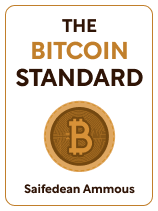

This article is an excerpt from the Shortform book guide to "The Bitcoin Standard" by Saifedean Ammous. Shortform has the world's best summaries and analyses of books you should be reading.
Like this article? Sign up for a free trial here.
Does bitcoin have a future? Will bitcoin become the new monetary standard?
According to economist Saifedean Ammous, bitcoin is here to stay, but it may never become the new monetary standard. In his book The Bitcoin Standard, he cites two major reasons bitcoin can’t replace fiat money completely.
Keep reading to learn about the limitations of bitcoin.
Will Bitcoin Become the New Monetary Standard?
Does bitcoin have a future? According to economist Saifedean Ammous, there are two reasons bitcoin will never be a global currency for day-to-day transactions.
First, as digital transactions go, bitcoin is slow. It takes about 10 minutes for a bitcoin transaction to clear. If you’re running a grocery store and have people in line to check out, you can’t wait 10 minutes for each payment to go through.
Second, bitcoin can’t handle a high enough volume of sales. The bitcoin network can only handle about half a million bitcoin transactions per day. That’s enough to cover large balance settlements between banks throughout the world, but not enough to cover all commercial transactions: A single major credit card company may need to process hundreds of millions of transactions per day.
These limitations are inherent in the design of bitcoin, so scaling up the bitcoin network as more people adopt cryptocurrency won’t appreciably increase the transaction speed or the number of transactions that can be completed per day.
| Making Bitcoin Faster There are a number of possible solutions to increase the number of bitcoin transactions that can take place in a given amount of time. One solution would be to change how the payment processing network operates for the purpose of making it more efficient and increasing the volume of transactions it can handle. Various people and organizations have developed other cryptocurrencies along these lines that compete with bitcoin, but so far, none of them have successfully challenged bitcoin’s market share. For example, “bitcoin cash” is a cryptocurrency that is closely based on bitcoin, but with larger “blocks” (meaning that more transactions can be added to the ledger at a time) and slightly relaxed security features. The bitcoin cash network should be able to process roughly a hundred times more transactions per day than the bitcoin network, but the time for an individual transaction to clear wouldn’t necessarily be any shorter. Thus far, “bitcoin cash” isn’t catching on: Due to lesser demand, units of “bitcoin cash” are worth less than a hundredth as much as bitcoins. Another alternative is to add a second layer of transaction processing to the bitcoin network, so that parties who are willing to trust each other can bundle all their transactions over a period of time into a single net transaction on the network. This is what the bitcoin Lightning Network does. In theory, the Lightning Network has the potential to make most bitcoin transactions almost instantaneous, and the number of possible transactions per day almost infinite. It remains to be seen whether it will ever be adopted on a large scale and work well enough in practice to provide a good solution. |

———End of Preview———
Like what you just read? Read the rest of the world's best book summary and analysis of Saifedean Ammous's "The Bitcoin Standard" at Shortform.
Here's what you'll find in our full The Bitcoin Standard summary:
- Why bitcoin has the potential to replace the gold standard
- What makes bitcoin stronger than fiat money
- Why bitcoin will never be a global currency for day-to-day transactions






